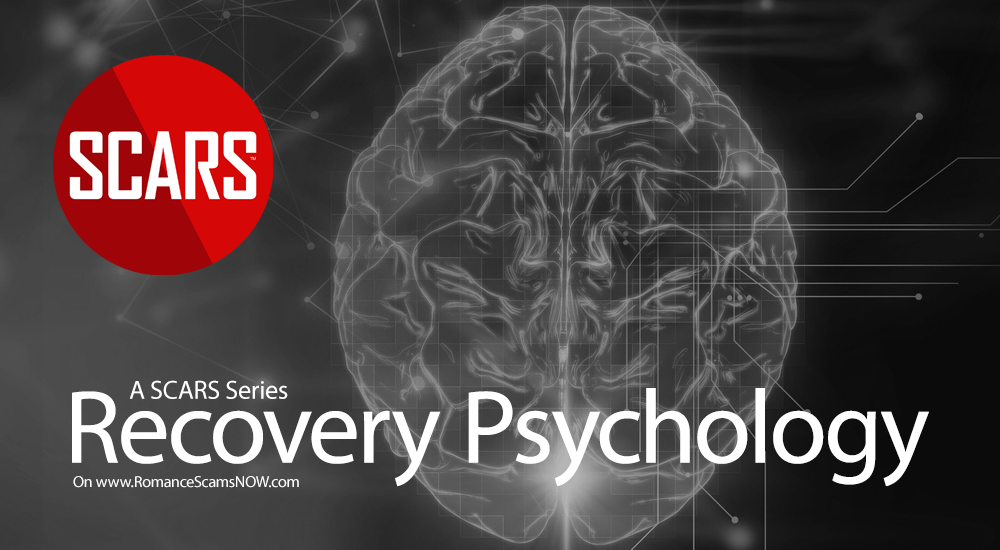
SCARS Institute’s Encyclopedia of Scams™ Published Continuously for 25 Years

Can PTSD Cause Brain Fog?
The Effects Of Trauma Can Linger – Brain Fog Is One Of Them
Thank you to PsychCentral for portions of this information.
About Brain Fog – if you sometimes lack mental clarity and feel fatigued, you may be experiencing PTSD-related brain fog. Post-traumatic stress disorder (PTSD) can arise after you experience a traumatic event.
There are many symptoms, including nightmares, flashbacks, and panic attacks, which can occur spontaneously or when something reminds you of the trauma.
Because of its broad effects on the nervous system, PTSD can cause some less well-known symptoms, too, including dissociation, brain fog, and physical pain.
The Link Between Ptsd And Brain Fog
Experiencing trauma can affect your body and mind in various ways. If you’re living with the aftereffects of trauma, you might notice a slow, sluggish mental state known as brain fog getting in the way of your personal or work life.

What Is Brain Fog?
As the name suggests, brain fog is when you’re unable to think clearly. You might experience:
- spacing out or being unable to focus
- feeling disconnected from your surroundings
- difficulty with memory
- trouble keeping up with conversations
- a short attention span
- losing your train of thought
- feeling disoriented
Brain fog isn’t a condition on its own. Instead, it’s a symptom with a range of possible causes, one of which can be PTSD.
Brain fog can make even simple tasks like grocery shopping very difficult: navigating the car park, remembering a list of items to buy, switching attention between products and prices, and reading ingredients can be confusing, overwhelming and exhausting.
How Can Trauma Cause Brain Fog?
PTSD and brain fog have something in common: inflammation. PTSD can lead to inflammation in the brain (neuroinflammation), which can contribute to brain fog.
Inflammation is a known contributing factor to physical health problems like cancer and heart disease — so it’s no surprise that PTSD-related neuroinflammation can lead to brain changes, as reported in a 2020 reviewTrusted Source.
The National Center for PTSD describes the relationship between inflammation and PTSD as bidirectional causal, which means the two cause or contribute to each other. They also identify a link between PTSD and autoimmune disorders, which research shows are also inflammation-driven.
Brain Fog And Nervous System Changes
Your sympathetic nervous system responds to trauma with a fight, flight, freeze, or fawn response. This response protects you by preparing your body for action against a threat. During this response, your body releases the stress hormone cortisol.
At the right time and in the right amounts, cortisol can be extremely helpful. For example, it can give you the energy to save yourself by accessing fuel (glucose and fatty acids) in your liver.
In excessive amounts though, this stress response can lead to inflammation.
After trauma, your nervous system needs a chance to reset and return to the parasympathetic state known as “rest and digest.” This is because staying in fight-or-flight mode maintains a continuous state of stress that can wear out your body and cause unwanted health effects.
If you live with PTSD, you likely experience repeated stress responses in the form of intrusion symptoms. This means you may live with higher amounts of cortisol.
The elevated inflammation can occur anywhere in your body, including in your brain. This can lead to effects like:
- brain fog
- cognitive difficulties
- memory loss
Complex PTSD
Trauma-related nervous system effects are amplified in complex post-traumatic stress disorder (CPTSD). CPTSD arises from ongoing trauma, like repeated abuse. It can be current or from your childhood.
If you live with CPTSD, you are more likely to experience a continued stress response with even less recovery time.
The repeated or prolonged stress response from PTSD and CPTSD increases your circulating cortisol, which affects your immune system and causes inflammation.
Symptoms of PTSD
According to the American Psychiatric Association (APA), PTSD symptoms fall into four categories:
- Intrusion: unwanted thoughts, such as memories and distressing dreams.
- Avoidance: refusing to talk about the trauma or avoiding people or situations that remind you of it.
- Alterations in cognition and mood: distorted or harmful thoughts, like believing you’re to blame, or that no one is trustworthy.
- Alterations in arousal and reactivity: mood shifts, potentially harmful behavior, hypervigilance, insomnia, and problems concentrating.
Brain fog is a type of alteration symptom that many people with a history of trauma experience.
-/ 30 /-
What do you think about this?
Please share your thoughts in a comment below!
LEAVE A COMMENT?
Thank you for your comment. You may receive an email to follow up. We never share your data with marketers.
Recent Comments
On Other Articles
- on Love Bombing And How Romance Scam Victims Are Forced To Feel: “I was love bombed to the point that I would do just about anything for the scammer(s). I was told…” Feb 11, 14:24
- on Dani Daniels (Kira Lee Orsag): Another Scammer’s Favorite: “You provide a valuable service! I wish more people knew about it!” Feb 10, 15:05
- on Danielle Delaunay/Danielle Genevieve – Stolen Identity/Stolen Photos – Impersonation Victim UPDATED 2024: “We highly recommend that you simply turn away form the scam and scammers, and focus on the development of a…” Feb 4, 19:47
- on The Art Of Deception: The Fundamental Principals Of Successful Deceptions – 2024: “I experienced many of the deceptive tactics that romance scammers use. I was told various stories of hardship and why…” Feb 4, 15:27
- on Danielle Delaunay/Danielle Genevieve – Stolen Identity/Stolen Photos – Impersonation Victim UPDATED 2024: “Yes, I’m in that exact situation also. “Danielle” has seriously scammed me for 3 years now. “She” (he) doesn’t know…” Feb 4, 14:58
- on An Essay on Justice and Money Recovery – 2026: “you are so right I accidentally clicked on online justice I signed an agreement for 12k upfront but cd only…” Feb 3, 08:16
- on The SCARS Institute Top 50 Celebrity Impersonation Scams – 2025: “Quora has had visits from scammers pretending to be Keanu Reeves and Paul McCartney in 2025 and 2026.” Jan 27, 17:45
- on Scam Victims Should Limit Their Exposure To Scam News & Scammer Photos: “I used to look at scammers photos all the time; however, I don’t feel the need to do it anymore.…” Jan 26, 23:19
- on After A Scam, No One Can Tell You How You Will React: “This article was very informative, my scams happened 5 years ago; however, l do remember several of those emotions and/or…” Jan 23, 17:17
- on Situational Awareness and How Trauma Makes Scam Victims Less Safe – 2024: “I need to be more observant and I am practicing situational awareness. I’m saving this article to remind me of…” Jan 21, 22:55
ARTICLE META
Important Information for New Scam Victims
- Please visit www.ScamVictimsSupport.org – a SCARS Website for New Scam Victims & Sextortion Victims
- Enroll in FREE SCARS Scam Survivor’s School now at www.SCARSeducation.org
- Please visit www.ScamPsychology.org – to more fully understand the psychological concepts involved in scams and scam victim recovery
If you are looking for local trauma counselors please visit counseling.AgainstScams.org or join SCARS for our counseling/therapy benefit: membership.AgainstScams.org
If you need to speak with someone now, you can dial 988 or find phone numbers for crisis hotlines all around the world here: www.opencounseling.com/suicide-hotlines
A Note About Labeling!
We often use the term ‘scam victim’ in our articles, but this is a convenience to help those searching for information in search engines like Google. It is just a convenience and has no deeper meaning. If you have come through such an experience, YOU are a Survivor! It was not your fault. You are not alone! Axios!
A Question of Trust
At the SCARS Institute, we invite you to do your own research on the topics we speak about and publish, Our team investigates the subject being discussed, especially when it comes to understanding the scam victims-survivors experience. You can do Google searches but in many cases, you will have to wade through scientific papers and studies. However, remember that biases and perspectives matter and influence the outcome. Regardless, we encourage you to explore these topics as thoroughly as you can for your own awareness.
Statement About Victim Blaming
SCARS Institute articles examine different aspects of the scam victim experience, as well as those who may have been secondary victims. This work focuses on understanding victimization through the science of victimology, including common psychological and behavioral responses. The purpose is to help victims and survivors understand why these crimes occurred, reduce shame and self-blame, strengthen recovery programs and victim opportunities, and lower the risk of future victimization.
At times, these discussions may sound uncomfortable, overwhelming, or may be mistaken for blame. They are not. Scam victims are never blamed. Our goal is to explain the mechanisms of deception and the human responses that scammers exploit, and the processes that occur after the scam ends, so victims can better understand what happened to them and why it felt convincing at the time, and what the path looks like going forward.
Articles that address the psychology, neurology, physiology, and other characteristics of scams and the victim experience recognize that all people share cognitive and emotional traits that can be manipulated under the right conditions. These characteristics are not flaws. They are normal human functions that criminals deliberately exploit. Victims typically have little awareness of these mechanisms while a scam is unfolding and a very limited ability to control them. Awareness often comes only after the harm has occurred.
By explaining these processes, these articles help victims make sense of their experiences, understand common post-scam reactions, and identify ways to protect themselves moving forward. This knowledge supports recovery by replacing confusion and self-blame with clarity, context, and self-compassion.
Additional educational material on these topics is available at ScamPsychology.org – ScamsNOW.com and other SCARS Institute websites.
Psychology Disclaimer:
All articles about psychology and the human brain on this website are for information & education only
The information provided in this article is intended for educational and self-help purposes only and should not be construed as a substitute for professional therapy or counseling.
While any self-help techniques outlined herein may be beneficial for scam victims seeking to recover from their experience and move towards recovery, it is important to consult with a qualified mental health professional before initiating any course of action. Each individual’s experience and needs are unique, and what works for one person may not be suitable for another.
Additionally, any approach may not be appropriate for individuals with certain pre-existing mental health conditions or trauma histories. It is advisable to seek guidance from a licensed therapist or counselor who can provide personalized support, guidance, and treatment tailored to your specific needs.
If you are experiencing significant distress or emotional difficulties related to a scam or other traumatic event, please consult your doctor or mental health provider for appropriate care and support.
Also read our SCARS Institute Statement about Professional Care for Scam Victims – click here to go to our ScamsNOW.com website.
















I experienced all of the examples of brain fog in the weeks after the scam ended. I was in a state of shock, denial, avoidance and the pain from the betrayal was so immense. As the weeks went by and I was able to heal somewhat, the fog began to lift and I was able to function better. I still have trouble staying focused for long periods of time, but in the beginning, my attention span was terrible. I’m finally seeing progress in my how I process information, which is so encouraging.
Of the 7 brain fog states I identify with 6 of them. There are times when brain fog is so insulating it is hard to even understand what is happening. But most of the time the different states are quick and move off. Mostly I struggle with feeling disoriented and a short attention span. I was attributing this to my age and the aging process. But….maybe it’s not all aging.